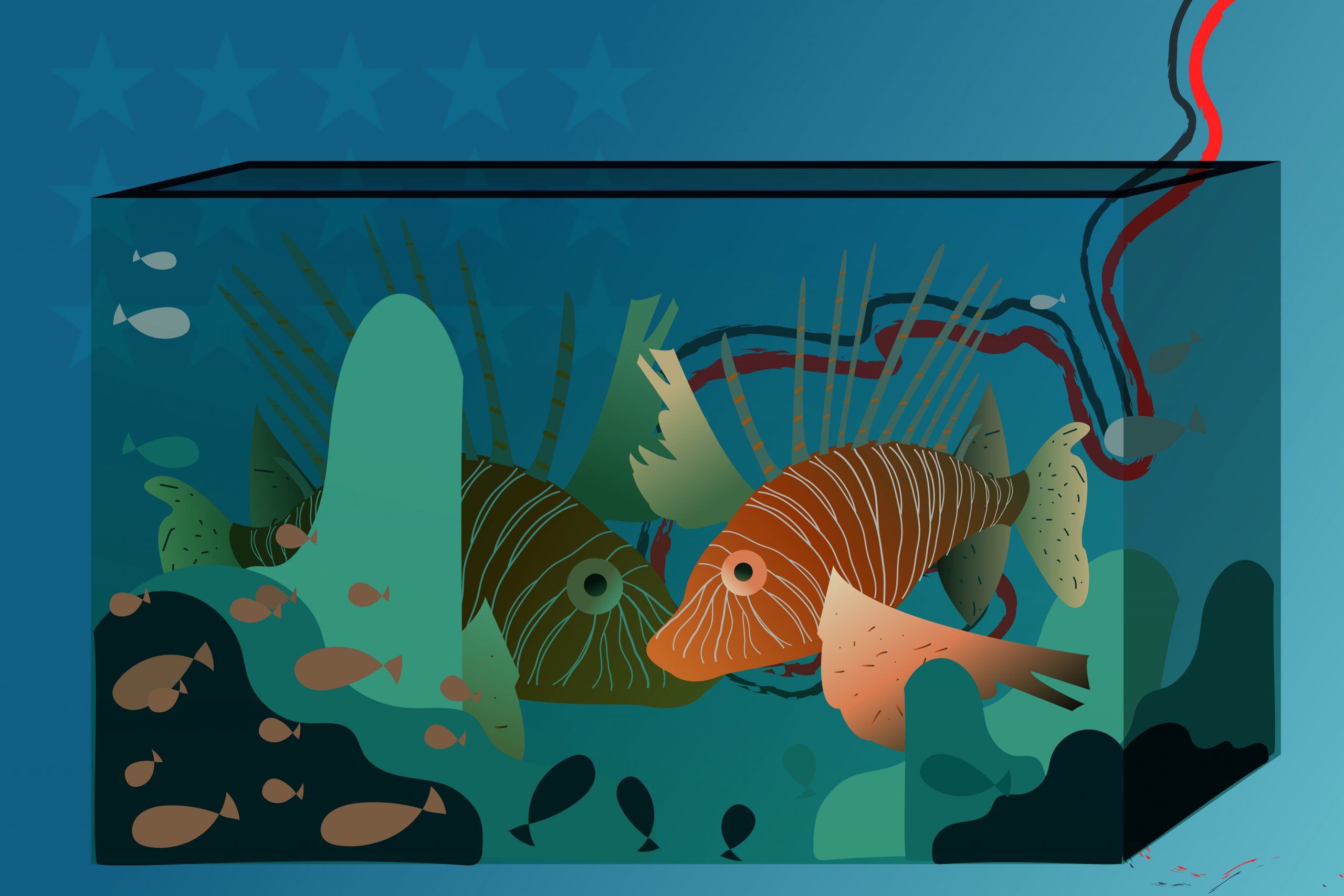Lionfish have become a staple among marine fish hobbyists. So much so that this once rare fish can now be found at your local Petco as easily as in a public aquarium. Dubbed “icons of the marine aquarium hobby,” lionfish are increasingly popular choices for people wanting to cultivate a saltwater tank without resorting to the all-too mainstream “Nemo and Dory” combination. Even as they inspire awe in the home aquarium, however, the lionfish can also be found on the menu in Floridian restaurants and on eco-tourist hunting trips.
Both facts can largely be attributed to the uncontrollable population of invasive lionfish currently stalking the Atlantic. As people came to learn, on top of being an ornamental fish and (allegedly) a good meal, lionfish are also the only self-sustaining fish species to spread across the coastal United States. Currently, they can be found throughout the Americas, mostly from North Carolina to Florida and throughout the Caribbean.
What Brought Them Here
A relative newcomer to this side of the planet, the first sighting of lionfish in the United States was in 1985, though their formal introduction to the continent is likely to have occurred at some point in the ‘90s. Their introduction to non-native waters was just another example of how people are wreaking havoc in the oceans, albeit a less direct one, as their presence in the North American continent is most likely due to the pet trade.
As a beautiful and formerly rare species, it’s understandable that fishkeeping enthusiasts would want to keep a lionfish as a pet. In more recent years, social media has become a “notable driver of exotic pet keeping,” as it portrays a far more entertaining perspective of previously lesser-known animals, particularly through videos. This could have easily spread the interest in lionfish far beyond marine aquarium hobbyists.
For example, Taylor Nicole Dean, the first “PetTuber” to reach a million subscribers on YouTube, features her dwarf lionfish in multiple videos, one of which has upwards of 449,000 views. The King of DIY, another popular PetTuber who posts videos about a number of large fish, has a video subtly titled “I LOVE THIS FISH!!” that features his lionfish and has garnered around 178,000 views.
Similarly, users on Instagram, TikTok and other social media sites are more than eager to share pictures and videos of their pets. These videos and posts often misrepresent how difficult lionfish are to care for and generally downplay the issues associated with keeping exotic animals as pets, portraying them as something cute, fun and ultimately desirable. The normalization of keeping wild-caught animals (and large numbers of animals in general) causes viewers to underestimate how difficult it is to properly care for them. It’s been shown that the attention social media generates can result in an increase of the number of people buying exotic pets, oftentimes without doing the proper research required.
Unfortunately, when reality doesn’t quite match up with the expectation, people attempt to rehome or release the animals that they are unable to care for. Multiple surveys have indicated that up to 10% of aquarium owners have deliberately released their unwanted fish.
This trend is not exclusive to lionfish, of course. It is also to blame for the introduction of goldfish, turtles, boas and other pets into ecosystems ill-suited for them. Lionfish require a bit more maintenance than the average goldfish, and yet many undergo a similar fate.
People have irresponsibly freed their lionfish into the wild under the assumption that this is somehow the most humane way to deal with their unwanted pets. But multiple releases likely led to a population of lionfish large enough to take over entire coral reefs — according to rough genetic estimates, fewer than a dozen fish could have started the entire invasion.
Small Fish, Big Impact
Anyone who has seen kudzu covering entire forests or feral cats crowding the streets knows just how obnoxious invasive species can be. Lionfish similarly interrupt the marine ecosystem wherever they are present. The lionfish’s diet consists largely of crustaceans and smaller fish, so they reduce native populations of marine animals and compete against fish that share the same diet. They also have unfair advantages over their competitors and prey, as lionfish breed at much faster rates and the local fish don’t recognize them as predators. Additionally, it’s been shown that lionfish are capable of eliminating entire species necessary for the health of coral reefs, such as the parrotfish that keep algae from overgrowing.
Just one lionfish can “reduce native marine creatures by 80% to 90% in its range within just 5 weeks”. They also hurt the ability of coral reefs to “recruit” new fish by 79%, decimating the populations of other marine animals.
Although this problem is most obvious in some parts of the Caribbean and off the East Coast of the United States, it is not completely confined to these waters. Some juvenile lionfish have even been found as far north as New York. But more worryingly still, researchers say that lionfish are also threatening marine life off of Brazil’s coast as of four weeks ago.
It’s unknown how they traveled so far south, but the fact that they are spreading so far below the equator is giving researchers reason to worry. Given that the tropical waters around Brazil have such rich biodiversity, the presence of the lionfish presents a real danger to the survivability of coral reefs, especially since Brazil has nearly a hundred marine fish species that can be found nowhere else in the world.
Putting Lionfish on the Menu
In response to the rampant invasion of lionfish, various solutions have been proposed and implemented in an attempt to keep the population in check.
One method is lionfish hunting, which includes a series of “lionfish derbies” hosted by the Reef Environmental Education Foundation (REEF). These sporting events invite fishermen to catch and kill as many lionfish as they can in a day. Even outside of these derbies, people dive into the Atlantic armed with spearguns and poles to help maintain the health of their coastal waters.
People have also made use of the “if you can’t beat them, eat them” approach. Plenty of restaurants located in lionfish-infested areas now serve the fish on their menus. You can even find lionfish in Whole Foods. Though this might not seem like the most ethical course of action for someone who dislikes killing animals, it ultimately exists to maintain the health of the ocean.
The National Oceanic and Atmospheric Administration (NOAA) also lists the aquarium trade as another market for the invasive fish. Ironically, the cause of the problem might also be the solution. Of course, catching lionfish from the wild to be sold as pets would only work so long as people don’t reintroduce them back into the ocean.
But even if the population can be contained, either by human intervention or natural causes, it only scratches the surface of the environmental damage done to our ecosystems by the petkeeping industry. The aforementioned solutions to the lionfish problem are hardly applicable to other invasive species that came about due to the pet trade.
In the end, it’s important to remember that there are many wide-reaching and unforeseen consequences for people’s desire to keep animals as pets, and while I could never bring myself to reject petkeeping in and of itself, people ought to think twice before making such a commitment.

















